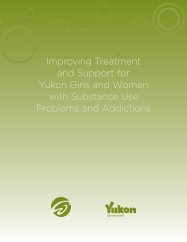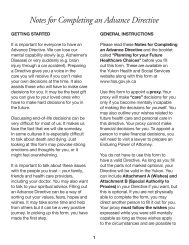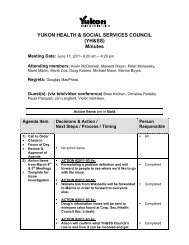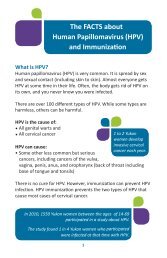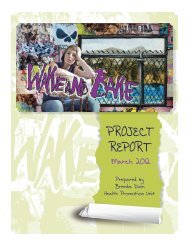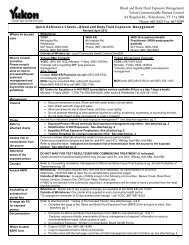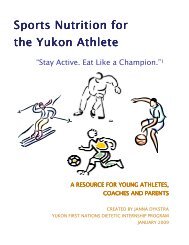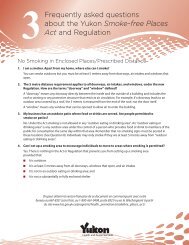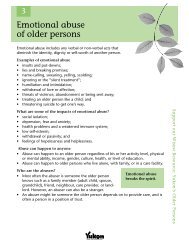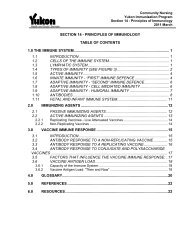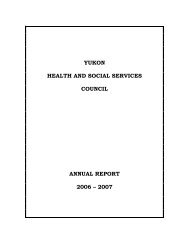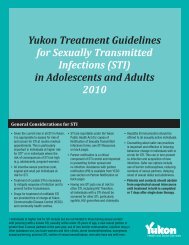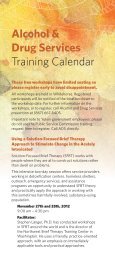Women and Alcohol: A women's health resource [2326.26 KB ]
Women and Alcohol: A women's health resource [2326.26 KB ]
Women and Alcohol: A women's health resource [2326.26 KB ]
You also want an ePaper? Increase the reach of your titles
YUMPU automatically turns print PDFs into web optimized ePapers that Google loves.
18 <strong>Women</strong> <strong>and</strong> <strong>Alcohol</strong><br />
substance abuse. In the morning, they can<br />
arrive <strong>and</strong> have breakfast together. With the<br />
MK2 program, retention of young mothers<br />
went from 26 per cent to 80 per cent plus.<br />
Says Bradley: “Often, women haven’t been<br />
parented well themselves, so we’re role<br />
modelling.”<br />
Annie Akavak used both the Pathways<br />
<strong>and</strong> the MK2 program to help her get her<br />
life back in order. When her daughter was<br />
taken from her, she found Pathways <strong>and</strong><br />
Jean Tweed, enrolling in the MK2 program.<br />
“That’s when everything changed. I stopped<br />
relapsing, started learning some coping<br />
skills.”<br />
Gradually Native Child <strong>and</strong> Family<br />
Services allowed Akavak to have her<br />
daughter with her for the day sessions of<br />
the MK2 program. Her daughter was in<br />
foster care. “They were seeking adoption<br />
for her with no visitation, “ says Akavak,<br />
crying.<br />
Over time, with Jean Tweed’s help, she<br />
won her fight for custody. “They saved my<br />
family <strong>and</strong> they saved me,” says Akavak.<br />
“It’s funny because a lot of people make fun<br />
of addicts. I don’t think they underst<strong>and</strong> how<br />
hard it is. To have someone acknowledge<br />
that you are willing to make a change is<br />
everything. Jean Tweed taught me how to<br />
be a better mother <strong>and</strong> a <strong>health</strong>y mother.”<br />
Role modelling is key at Breaking the<br />
Cycle, primarily a children’s mental <strong>health</strong><br />
centre at Queen <strong>and</strong> Bathurst. Behind the<br />
bright blue painted doors of a former United<br />
Church is a hub of activity: a one-stop<br />
shopping service for pregnant <strong>and</strong> parenting<br />
mothers of children 6 <strong>and</strong> under, all with<br />
substance-use issues. Every Thursday, Dr.<br />
Gideon Koren, a pediatric toxicologist at<br />
the Hospital for Sick Children, comes to the<br />
centre to offer an FASD diagnosis clinic.<br />
“It’s a very unique setting because it’s<br />
an opportunity to see the birth mothers,”<br />
says director Margaret Leslie. “This is a<br />
population of women who aren’t normally<br />
seen. This is a safe place where they can<br />
ask all the questions they haven’t wanted to<br />
ask another physician. These mothers want<br />
their children to have success in school in<br />
a way they never did. Every single mom’s<br />
biggest worry is the effect of the prenatal<br />
exposure.”<br />
A woman cannot be intoxicated or high<br />
when using the centre. Breaking the Cycle<br />
offers addiction counselling, <strong>and</strong> also has a<br />
partnership with Toronto Western Hospital,<br />
which has trauma services, plus mental<br />
<strong>health</strong> <strong>and</strong> addiction services.<br />
The centre’s ultimate goal? “To<br />
promote attachment,” says Leslie, waving<br />
to a vibrant young mother arriving with<br />
her newborn son. The woman is here for<br />
parenting class. “We are an attachmentbased<br />
program. In the end, the stronger the<br />
attachment, the higher the protective factor<br />
in mothering.”<br />
Today, Annie Akavak lives in group<br />
housing with two of her four children:<br />
3-year-old Akianna <strong>and</strong> 2-year-old Sakai.<br />
She’s on the list for subsidized daycare,<br />
but has no idea when her name will come<br />
up. She has one break each week: the hour<br />
when she goes to therapy. She’s tired, but<br />
happy. Most of all, she is determined not<br />
to do to her children what was done to her.<br />
She would like to work in a group home,<br />
helping runaways. But this is a long way<br />
away. First, she has to go back to school.<br />
Her fondest dream? “To own my own<br />
home,” says Akavak, who says she once<br />
lived in almost every hotel in Toronto. “A<br />
place where we can be together. No more<br />
running <strong>and</strong> moving. A place where we can<br />
root ourselves.”<br />
For Akavak, being rooted is what it’s all<br />
about.<br />
Your brain on alcohol<br />
This is your brain on alcohol. If you<br />
are adolescent <strong>and</strong> female: consume four<br />
drinks at one sitting, <strong>and</strong> you leave yourself<br />
vulnerable to compromising what is known<br />
as your spatial working memory. Binge<br />
drinking in adolescence can interrupt<br />
normal brain cell growth, particularly in<br />
the frontal brain regions critical to logical<br />
thinking <strong>and</strong> reasoning. In short, it damages<br />
cognitive abilities — especially in female<br />
teens.<br />
“Even though adolescents look like<br />
adults, their brains are still maturing,” says<br />
researcher Lindsay Squeglia, lead author<br />
of a new study in <strong>Alcohol</strong>ism: Clinical<br />
& Experimental Research. “Throughout<br />
adolescence, the brain is becoming more<br />
efficient, pruning. In female drinkers, we<br />
found that the pre-frontal cortex was not<br />
thinning properly. This affects executive<br />
functioning.”<br />
“Are the girls trying to keep up with the<br />
boys?” asks Edith Sullivan, a researcher at<br />
Stanford’s School of Medicine. “Quantity<br />
<strong>and</strong> frequency can be a killer for novice<br />
drinkers. Adding alcohol to the mix of the<br />
developing brain will likely complicate the<br />
normal developmental trajectory. Long after<br />
a young person recovers from a hangover,<br />
risk to cognitive <strong>and</strong> Your brain on alcohol<br />
brain functions endures.”<br />
Sullivan, who has done a lot of work with<br />
the brain structure of alcoholics, is certain<br />
that what is known as “telescoping” is real:<br />
“As they develop alcoholism, women seem<br />
to develop dependence sooner than men.<br />
Drink for drink, it is worse for females.”<br />
Do adult women have more difficulty<br />
recovering from alcoholism? According to<br />
Sullivan, “The jury is out as to whether men<br />
or women recover faster. We have studied<br />
alcohol dependent men <strong>and</strong> women, <strong>and</strong><br />
have found similar extents of regional brain<br />
tissue shrinkage. <strong>Women</strong> look no worse off<br />
than men. To me, that’s good news.”<br />
<strong>Alcohol</strong> has dizzyingly<br />
different effects on<br />
women <strong>and</strong> men – <strong>and</strong><br />
it’s not just about height<br />
<strong>and</strong> weight. Drink for<br />
drink, it’s worse for<br />
females.<br />
Sullivan underscores that recovery<br />
is possible: “<strong>Alcohol</strong>ism is a dynamic<br />
process. It takes a while to develop, <strong>and</strong> to<br />
resolve. I like to use the stroke model: they<br />
get a year to recover.”<br />
What leads to alcoholism in one person,<br />
<strong>and</strong> not in another? “Style of drinking<br />
factors,” says Sullivan. “And genetic<br />
background — some people may be more<br />
prone to alcoholism.”


![Women and Alcohol: A women's health resource [2326.26 KB ]](https://img.yumpu.com/22340649/18/500x640/women-and-alcohol-a-womens-health-resource-232626-kb-.jpg)
